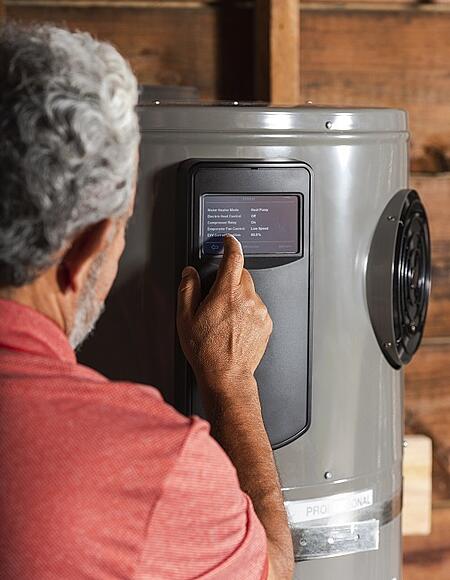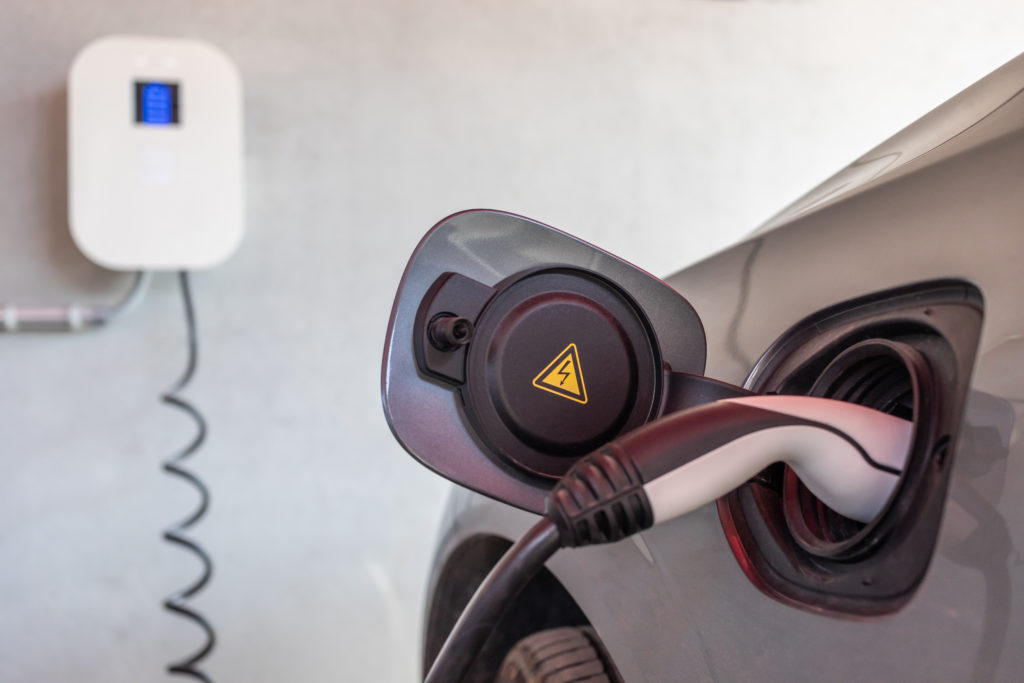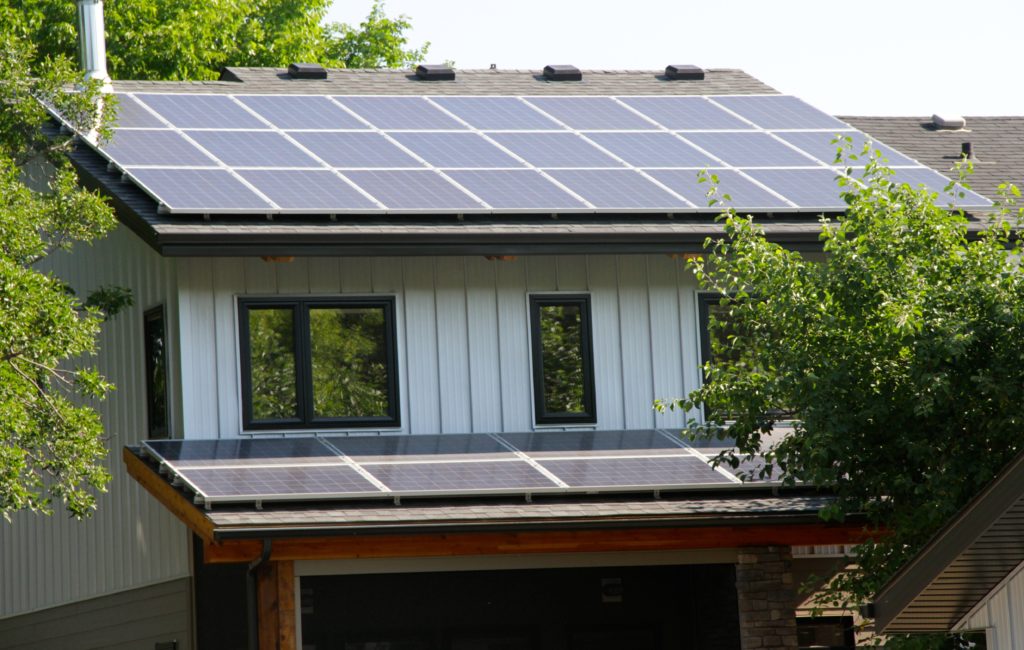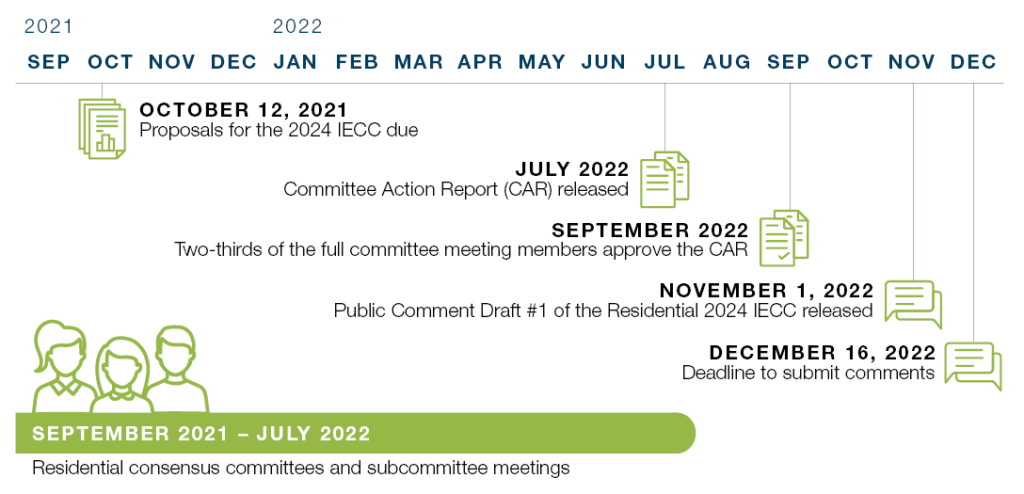The 2024 draft Residential International Energy Conservation Code (IECC) is now out for public comment. The provisions in the 2024 code will build on the energy efficiency advancements made in the 2021 code cycle and introduce key provisions to address greenhouse gas (GHG) emissions and improved grid reliability benefits. Adoption of these provisions will be critical for jurisdictions with ambitious climate goals.
A 45-day review period for the 2024 Residential IECC is underway, and it is a critical time for stakeholders who have so far been watching the code development process from afar to weigh in. Interested stakeholders have until Dec. 16, 2022 to submit comments through cdpACCESS on the code language that jurisdictions will depend on for their next code cycle to make good on their climate commitments.

Residential IECC Reflects Compromise and Progress
With buildings currently representing 39% of U.S. carbon emissions, leading jurisdictions recognize the importance of using building codes and performance policies to respond to the effects of climate change and reduce future risks. To keep temperature rise below 1.5 degrees Celsius, new construction in the U.S. must be all-electric by 2025, and climate-optimized by 2030. With just one code development cycle taking us to 2025, and only three to reach 2030, the provisions adopted into the 2024 IECC are critical to achieve the model code we need as a stepping stone to 2030.
The code development process for the 2024 IECC was new compared to previous cycles: the International Code Council (ICC) adopted a standard-setting process that relies on a committee, not governmental member voting representatives, to determine what gets incorporated into the code. (Learn more about the new code development process in our blog about the 2024 Commercial IECC.) This new process has reduced the number and variety of voices participating in the process and has required more compromise amongst members of the code committee.
Because of my appointment to the IECC Residential Consensus Committee, New Buildings Institute (NBI) had a strong voice in the development of the 2024 IECC draft that’s out for comment. NBI helped ensure several groundbreaking proposals were included in both the Commercial and Residential 2024 IECC. Go to our earlier blog for a recap of the Commercial proposals that were most significant for climate action. In the Residential code, we worked hard to ensure key proposals that support transportation and building decarbonization were included in the draft. Because of the change in process and interests represented by the voting members of the committee, this required countless hours of negotiations. The draft Residential code represents compromises made on both sides.

See all of the NBI proposals that were approved and included in the monograph. Several of these represent the most significant changes that will help jurisdictions continue to make progress on climate action, including:
- Electric readiness for fossil fuel-burning hot water heaters, cooking appliances and clothes dryers. This is significant, because it allows for easy retrofits in the future by making sure an electrical outlet is already installed at the location of that appliance when the home is being built, greatly reducing the retrofit cost.
- EV charging-ready infrastructure to be provided for most homes and multifamily buildings to facilitate the installation of a level 2 (240-volt) charger—a more convenient and faster charger when compared to a level 1 charger. This will reduce one of the current barriers people face when determining whether or not to purchase an electric vehicle (EV). It also prepares all homes for the near future where emissions-free vehicles will be the norm. With all major U.S. auto manufacturers, committed to end the production of fossil fuel vehicles by 2040, this is a necessary change to the code.
- Solar-readiness infrastructure for unshaded roofs with optimal orientation for the future installation of photovoltaic panels. This will prepare homes for solar installations without the burden of needing to install or upgrade electrical infrastructure or complete demolition that may be disruptive, to accommodate the new system.
- Credit-based system for incorporating additional efficiency gains. Similar to a change in the 2021 Commercial IECC, this change to the code removes option packages and assigns them credits that are equally calibrated for energy impact. This change creates a level playing field for efficiency in all new construction.

NBI estimates that the gains made in this code cycle will put the IECC on track for achieving a climate-aligned energy code by 2030. We expect the following outcomes:
- Approximately 5-8% improvement and associated reduction in consumer costs
- An increase in all-electric homes that can save up to $16,200 over 30 years
- Creation of jobs, improved health, and accelerated transition to an equitable clean energy economy
Make your Voice Heard
New construction codes and policies, when aligned with climate goals, are some of the most cost-effective ways for jurisdictions to cut carbon emissions, save energy, improve comfort and health, and increase housing affordability. It is important to weigh in during the 45-day comment period on what is a critical code cycle for addressing climate change. The ICC and Residential Consensus Committee need to hear your support for building codes that address climate change. We expect several climate-aligned proposals to receive significant pushback including: EV infrastructure, electric-readiness, and renewable energy requirements. Future proofing our homes to allow for upgrades to non-fossil fuel burning appliances and vehicles is critical to meeting our climate goals and must be required for all new homes. To support all-electric homes, we need to provide a basic level of grid interconnection capability that enables equipment to respond to grid signals, and it’s not too late to make this demand. Our demand response (DR) thermostat proposal, that would allow occupants to voluntarily participate in DR utility programs, was submitted as a mandatory provision but made optional as part of the final draft negotiation when it was moved to the additional efficiency options. We believe this control functionality should be available to all utility customers.
We also expect efficiency measures to come under attack. Investments in the building envelope are critical to facilitating electrification of space conditioning equipment and improves thermal comfort and indoor air quality. Several sensible proposals that sought to reduce air leakage and improve building ventilation that should be required for all homes were moved to the optional efficiency section essentially making them voluntary, meaning many new home owners will miss out. Additionally, several proposals were introduced to trade envelope efficiency for more efficient mechanical equipment. This is a misaligned approach that does not move us closer to meeting climate goals. We advocate for careful consideration of envelope improvements that address climate variations and the progress made in the IECC 2021 development cycle.
 Our draft comments will provide language that will make it easier for others to weigh in on these changes. Please sign up for our Codes for Climate newsletter to ensure you get an email when our draft comments are completed. In the meantime, I encourage you to review the following resources and join our upcoming webinar, where I and Lauren Urbanek of Natural Resources Defense Council will lead a discussion about the 2024 Residential IECC public commenting process.
Our draft comments will provide language that will make it easier for others to weigh in on these changes. Please sign up for our Codes for Climate newsletter to ensure you get an email when our draft comments are completed. In the meantime, I encourage you to review the following resources and join our upcoming webinar, where I and Lauren Urbanek of Natural Resources Defense Council will lead a discussion about the 2024 Residential IECC public commenting process.
The deadline to submit comments is Dec. 16, 2022. Take these actions:
- Review the Public Comment Draft #1 for the IECC Residential.
- Follow the detailed instructions on how to submit comments through CDP. Also available is this 10-minute cdpACCESS tutorial and a 30 minute webinar.
- Watch the on-demand webinar, hosted on Nov. 15, 2022, to learn more about major changes to the code, the process for submitting public comment, and guidance on how you can influence decision makers.
- Sign on to a general (coming soon) or a topic-specific letter supporting a critical topic. Here we have a letter on electrification.
- Fill out this Google form by December 1, 2022 to let us know if you want to sign in support of a letter, how you will engage during this comment period, or if you’d like help submitting comments to the ICC.
Please check back for upcoming resources and other news or sign up to be among the first to be notified when those resources are available here. Email me at [email protected] with questions.
by Mark Lyles, Senior Project Manager
Bio
Did you enjoy this content? Consider supporting NBI’s work with a donation today.
